Wonk Night is sponsored and hosted by Lancaster Engineering. Drinks for this month’s event were provided by Widmer Brothers Brewing, makers of Omission Beer.
On Tuesday night we brought together some of Portland’s most dedicated and whip-smart parking reformers for our monthly Wonk Night. It was a sincere pleasure to be in a lively room of about 50 people who all want Portland to do a better job using auto parking as a tool for good instead of evil.
We made auto parking reform the theme of Wonk Night because how we deal with this issue is directly related to bicycling in more ways than you might think. We all know that coveted curb lane people park cars in is prime real-estate that could be used for much more useful things like safe and protected bikeways; but parking policy goes way beyond cycling. It directly influences how our city grows and who the winners and losers are when it comes to street access. This conversation is also about the negative impact automobiles have on our public spaces. As we grow, we can either manage these spaces more effectively or we’ll continue to face higher housing prices, a lower quality of life, and the continued overuse of cars that is preventing our city from achieving its climate, transportation, and growth goals.
To help us wade through this topic, we invited four experts to join us:
– Chris Smith: Portland Planning Commissioner and veteran urban policy activist. Smith was invited to help us understand the city planning context of the issue.
– Tony Jordan: Founder of Portland Shoupistas, a grassroots community group organizing for progressive parking policy in Portland. Jordan was invited to help us see the issue from an activists perspective.
– Joe Cortright: President and principal economist at Impresa Consulting and contributor to City Observatory. Cortright was there to share his insights from a numbers and data perspective.
– Brian Davis: Senior transportation analyst at Lancaster Engineering and director of that firm’s Streetlab. Davis was invited to share his perspective on what it’s like on the front lines of executing a city’s parking policy as a paid consultant.
Before we get into the recap, here are a few photos of the faces in the crowd:
Advertisement
We started off with an overview of where parking reform stands in Portland.
The City of Portland is in the midst of their Citywide Parking Strategy project. It’s the first major parking policy overhaul since 1996. With so much change in the past 20 years and with so much at stake in the future it’s imperative for transportation reform activists — especially those who think our city will work better with fewer cars — now is the time to learn more about this topic and get involved with these discussions.
For about a year now, the city has been having committee meetings and doing analysis on several different fronts with the hope of integrating the results into their update of the Comprehensive Plan. The work boils down to two parts: a revamp of policies in the Central City; and a new approach to parking in and around “centers and corridors,” areas like the 28th Avenue commercial district, St. Johns, Hollywood, and the Mississippi district.
“Parking is a fertility drug for cars.”
— Chris Smith, City of Portland Planning Commissioner
Chris Smith started us off by recounting his recent victory against parking minimums in Northwest Portland. Smith made his stance on the issue very clear with the quote of the night: “Parking is a fertility drug for cars.” With that in mind he persuaded fellow commissioners to deny a request from northwest residents to institute a requirement for parking minimums similar to the policy passed by Mayor Charlie Hales and city council in 2013. That decision is seen by parking reformers as a huge mistake and early data shows it might have led to higher housing costs because housing developers either passed along the cost of the parking spaces to tenants or they built fewer than 30 units (thus limiting supply) in order to not trigger the parking requirement.
Smith said PBOT Commissioner Steve Novick and Director Leah Treat are now reviewing all the input and information gleaned in the process so far to prep for a presentation at City Council in June. As to how council members stand on the issue, “They want to do the right thing,” Chris Smith said, “but they have to balance that with other issues.”
Those “other issues” are things like outcry from some Portlanders who want more parking because they feel new development is gobbling up all the parking in their neighborhood. That issue is what got Tony Jordan interested in parking policy six years ago when his neighborhood around inner SE Division Street saw a massive apartment and condo boom. When people started fighting the increased density largely due to parking concerns, Jordan became an advocate for progressive parking policy. He now runs the Shoupistas and sits on several of the city’s parking advisory committees.
“[It’s] Better to give lower-income people a choice to pay rather than force them to pay by default.”
— Rebecca Hamilton
For the urban economist Joe Cortright, this is all the result of an increase in demand for cities. “The demand for urban living is increasing faster that we can create supply,” he said. If we have to include a parking space as we create that supply, Cortright said it adds on average $200-250 a month to the price of an apartment — whether you own a car or not. He said Oregon’s “inclusionary zoning for cars” is creating demand for car use. “We have traffic james in the U.S. for the same reason we had bread lines in Russia,” he said, making a point about the impacts of not pricing parking at what it actually costs society.
We talked a lot on Tuesday night about how parking policy impacts lower-income people. If you make parking spots more expensive (a position strongly favored by reformers) poor people won’t have a place a park. “How do you respond to that argument?” someone asked. There seemed to be a consensus around the room that higher-priced parking is better than the current scenario where everyone pays to subsidize parking whether they use it or not. Rebecca Hamilton said that it’s “Better to give lower-income people a choice to pay rather than force them to pay by default.”
Everone also seemed to agree that parking revenues should be spent on things like public transit and other system-wide improvements that have broad social benefits. Portland City Commissioner Amanda Fritz recently argued against raising parking prices downtown because she said poor service workers often need to drive after-hours when transit isn’t running. Iain Mackenzie said the best response to that is to use the extra parking revenue to fund a “night-owl” bus service. Tony Jordan added that during his time on the meter hike subcommittee he encountered a rep from the Service Employees International Union who was against higher rates. Jordan asked how many of their members didn’t own cars and she didn’t know the answer. The SEIU rep then shared an anecdote about a downtown worker who got off shift at 3:00 am and waiting at Subway until 5:00 am to take a bus home. “This anecdote led me to propose,” Jordan wrote us in an email follow-up after Wonk Night, “when I gave testimony to council supporting the increase, that they use the money for reduced income bus fare.”
Underscoring Jordan’s point, Zef Wagner with the City of Portland said when it comes to understanding how parking prices might impact low-income people, it’s always best to ask them directly instead of speculating about their needs and desires with other planners and activists.
Brian Davis, the engineer whose firm PBOT hired to analyze parking usage in northwest Portland said, “I get to be the bullshit detector for agencies.” One of the takeaways of his work was that parking spots have the highest turnover in places with the highest mix of nearby land-uses. The data he collected showed that there was no need for many of the two-hour parking spots in northwest. And it just so happened that PBOT’s Parking Operations Division Manager Malisa McCreedy was in the room too. “Brian’s analysis,” she shared, “informed our policy and we’ve removed many of the two-hour minimum spaces.”
Another topic someone brought up was how persuade the non-believers that parking should be more expensive. Davis said instead of focusing on how much parking costs will increase, “We need to rephrase it to, ‘How much would you pay to have a space?'” This framing jibes with Chris Smith’s advice that the argument will be lost if the focus is on using parking policy to discourage driving. Rather, he says, the focus should be on how better policy will make parking more available to those who really need it and — more importantly — are willing to pay a fair price for it.
Thanks to everyone who came to Wonk Night. Please share your takeaways in the comments and stay tuned for more coverage of this topic.
— Jonathan Maus, (503) 706-8804 – jonathan@bikeportland.org
BikePortland can’t survive without subscribers. It’s just $10 per month and you can sign up in a few minutes.



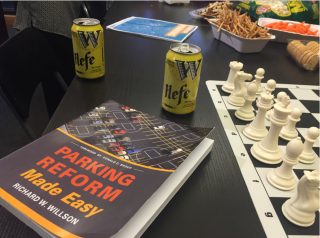

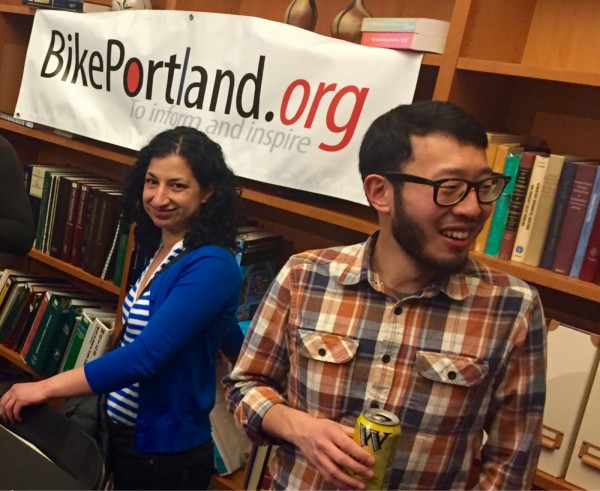
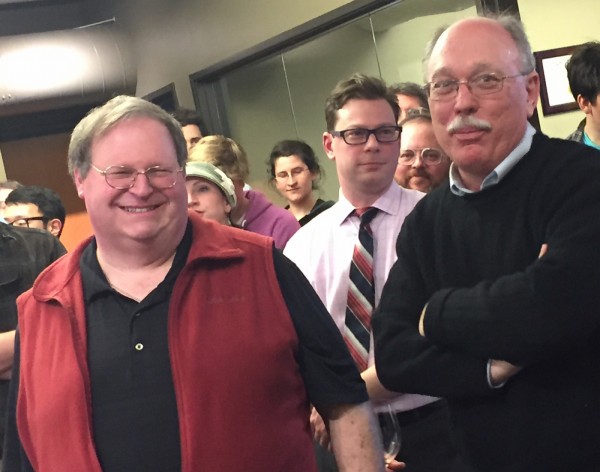
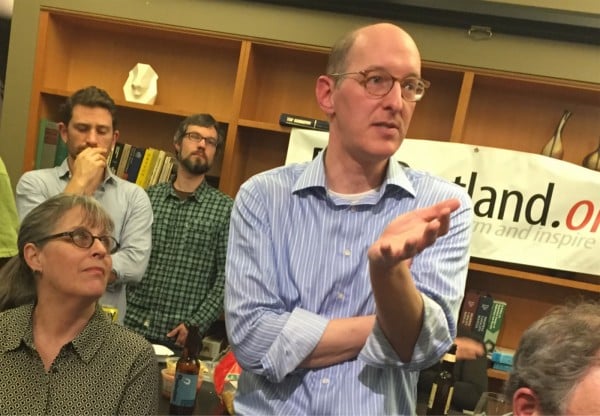
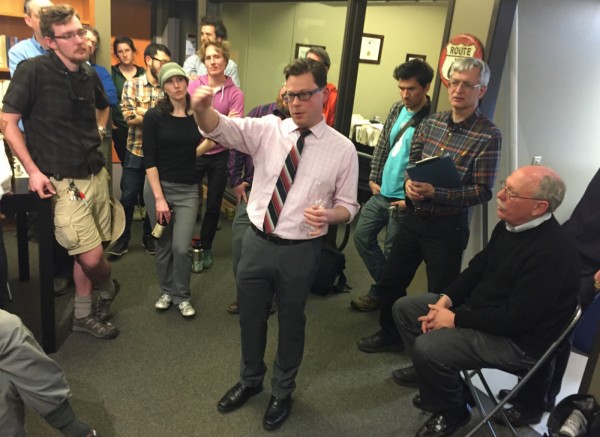
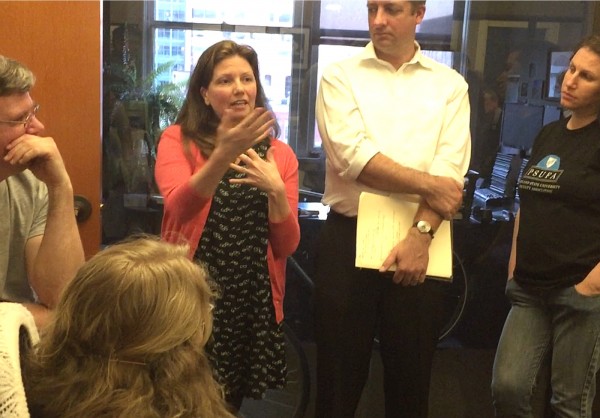

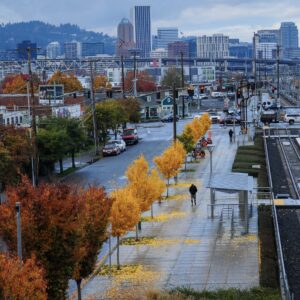
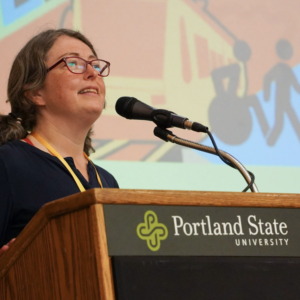
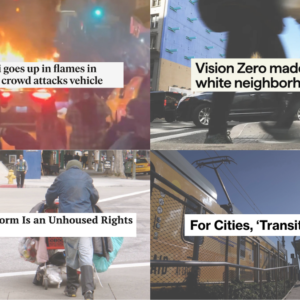
Thanks for reading.
BikePortland has served this community with independent community journalism since 2005. We rely on subscriptions from readers like you to survive. Your financial support is vital in keeping this valuable resource alive and well.
Please subscribe today to strengthen and expand our work.
Can someone who understands economics please explain the following two things to me:
1) The summary above quotes several people as saying that if developers have to build parking, it will increase the price of development, and developers will have to pass those costs onto renters, and that will raise rents. What I don’t understand is if renters would be willing to pay the raised rents, why wouldn’t the developer charge the higher rents regardless of whether they had to build parking or not?
2) The other statement made was that increased parking costs might cause marginal projects not to get built. My question is in our current market, is there any overlap between areas where parking is undesirable (i.e. inner city) and areas where profits are so marginal that a parking requirement might deter a project from being built? And if there is an overlap, is it big enough that we should worry about it from a supply standpoint?
I do think there are reasons to consider not requiring parking minimums in some projects, but these two issues are frequently cited, and I don’t think they hold up under scrutiny. I think it better to focus on more solid reasons instead of these canards.
If I am mistaken, would someone please point out where my thinking is wrong?
1) housing is nearly always affordable to someone and in our market there are apparently plenty of people willing to bid up the cost of housing. So, you are correct that in a market like this the cost of on-site car parking might not directly increase rent, but it will decrease the profit margin. That has an effect on determining how many units are built, which is in a feedback loop with the supply.
Furthermore, look at it another way. If there is NO parking and you can’t get a permit to park on the street, or if the street parking is expensive too, then a unit without on-site parking lacks that amenity and should be cheaper than a unit with parking. If the on-street parking is free, then the amenity is effectively equal and the price will be similar.
Finally, in most parts of the city a developer can’t really get away with charging a monthly rate for on-site parking that covers construction and lost opportunity (100-250 a month depending on if it’s underground, etc). So the money they can’t charge, they will have to spread out over the other units.
2) The city hasn’t studied this, but there’s some anecdotal data that, yes, there are developments that would have likely had more than 30 units built that ended up at 30. There are probably places where developments didn’t happen.
I think those effects were the actual intended effect of the policy by neighbors. Based on my experience in 2013, neighbors were generally opposed to the policy that would actually mitigate parking trouble (meters and permits). I think, ultimately, the real desire was to stop the development as much as possible and prevent more tenants from moving in.
I think outside the inner city, a unit with no parking would be difficult to rent, so developers may impose their own parking minimums there.
It will be interesting to see what happens when some of these new parking districts are created that exclude people renting along the commercial corridors, which are probably the best places to build with no parking. It may be that that will either cap prices (because people won’t be willing to pay as much for a space with no parking) or encourage tenants to not own a car.
If it’s the first, then developers may start building parking again (to be able to charge higher rents). If the second, then that would be a positive outcome.
I do believe that in the next 10-15 years, we’re going to start to see a fundamental shift in the way cars are owned, stored, and used, and that may make all of these conversations seem quaint.
That 10-15 year time frame is why we need to think long and hard about every space we build now. Those spaces will last 50 years or more, taking up space and costing money. Let’s price the on-street and see what happens, that has much less permanence than structured parking.
I kind of agree with you. However, I also think that people are pretty creative when it comes to repurposing space, so I do not foresee huge swaths of prime real estate sitting empty for long.
I wish that all my neighbors complaining about lack of parking would realize that giving it away for free is the cause of their issues.
Maybe we should follow 9watt’s suggestion, and just sell the parking areas to the adjacent landowner. Or my suggestion to auction off spots on an annual basis. Maybe your neighbors would go for that.
The last time I was looking for an apartment I had a few very middle class items on my “must have” list. These included having a washer and dryer in the unit, a dishwasher and hardwood floors. Although those are pretty common features in new build apartments, they are not necessarily all easy to find in the older apartment buildings I was looking at in Northwest. Realizing that I knew I might have to pay an above average rent per square foot for my neighborhood. Had I been willing to sacrifice those amenities I could have found an apartment of the same size in the same area for less money. Conversely, if I had wanted a parking space I would have had to pay more, because most of the rental stock in Northwest doesn’t come with a parking spot. The fact that there are choices in the market lets people reveal their preferences via what they’ll pay for.
If we require parking we take away that choice. The cost gets passed on to everyone, whether they use it or not. For that reason, I don’t think the city should require parking spots, just as they don’t require washer and dryers in the unit, dishwashers or hardwood floors.
(Incidentally, the same is true of bike parking. By mandating that developers build bike parking, the cost of that gets passed on to everyone, regardless of whether they bike or not. Beyond the social benefits of encouraging bike use, there is a huge difference in degree. The amount of building area required to store bikes is a fraction of what is required to store cars, and therefore the extra costs are a fraction.)
The problem I have with your washer/dryer analogy is that if someone has a car and nowhere to park it, they’ll impose a social cost on someone else to solve the problem.* The same is not true for laundry.
* Please, I don’t want to argue about whether someone has the right to store their personal property on public land for free and so on… that’s not the point, and most people think greater hassle = social cost.
But do you accept my argument as answer to your question “why wouldn’t the developer charge the higher rents regardless of whether they had to build parking or not?”
I do in NW Portland, where on-street parking availability is nil, but that is different than in most places where we’re seeing new development.
If tenants of a new development have to pay extra to park a car, and there is no free alternative (as in the NW, or if parking districts are created in other areas that exclude residents of commercial districts), then yes, I could see rents being reduced if there are not enough car-free tenants to pick up the slack.
But… if it does drive rents down, developers may well start adding parking again in order to recapture higher rents. So it may be self-defeating in the end.
I suspect parking districts will encourage developers to build more parking, but that does not contradict your point.
Quick correction on something attributed to me:
I didn’t meet with any SEIU workers.
When I was on the Meter Rate Adjustment Subcommittee there was another member of the committee who was an SEIU representative. Their position was that higher rates would hurt their workers. I asked how many of their members didn’t own cars and she did not know the answer. She did respond with an anecdote that she knew a downtown worker who got off her shift at 3AM and waits at Subway until 5AM when the bus runs.
Just want to clear that up. I don’t know how many SEIU members have cars and neither (as far as I know) does SEIU.
At the city council heard on the rate adjustment I proposed that the money from meters go towards discounted bus passes. I think night owl service would also be a good way to spend it.
thanks TonyJ! I must have heard and scribbled my notes wrong. I’ve fixed the story to reflect that. Thanks again for showing up and for all the work you’re doing.
later last night, ODOT discussed a proposed $400 M freeway widening and street reconfiguration project near the rose quarter. 4 people attended and 3 staffers.
Allan, is this plan the one you’re talking about?
yep. that’s the one Emily. A classic freeway zombie project. we’ll keep tabs on it and be ready to shoot it dead if it ever really tries to come alive for real.
What’s going on with paid permit street parking in congested residential neighborhood?. Is that coming to any Portland neighborhood?
There’s one going in around Clinton Street Station, I think. I don’t know any specifics.
One of the largest employers in the region is currently in the process of adding 4,400 parking spaces to its campus in Washington County. Surely this will have a negative impact on Portland by inducing more demand on 26 and other local roads.
I am far more supportive of limiting parking for employers than I am for residential neighborhoods.
I don’t think anyone has proposed limiting (parking maximums) for residential neighborhoods.
Sure they have. That’s exactly what permitted parking does. Implementation details determine who is “limited”.